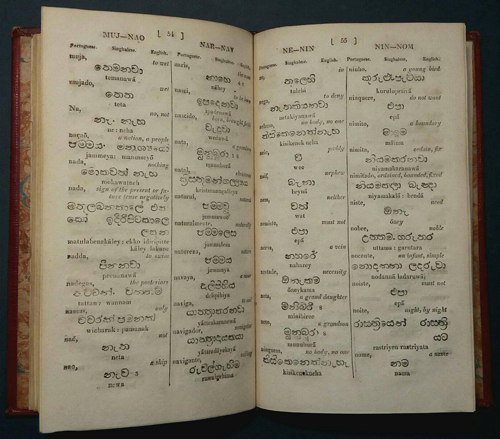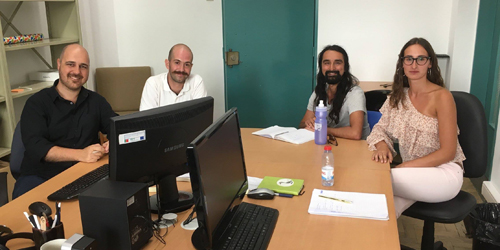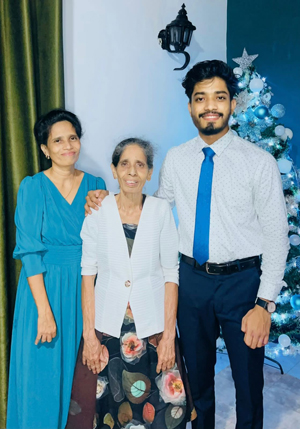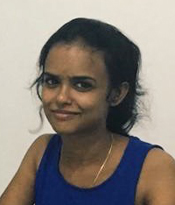Spreading the word of Sri Lankan Portuguese Creole

Preserved from 1819: A dictionary of Sri Lankan Portuguese, Sinhala and English published by the Colombo Wesleyan Press
Trinco resident Vyvonne Joseph, grew up speaking Sri Lankan Portuguese Creole (SLPC) with her parents, younger sister and younger brother. Even though their use of SLPC is somewhat limited as it is only spoken at home and with extended family, Vyvonne says that even their Tamil neighbours have picked up a little SLPC over the years, and speak it to them.
Although few are aware of the existence of this language, SLPC is spoken by the Portuguese Burghers in Sri Lanka. When the Portuguese colonised the maritime areas of Sri Lanka, this language was formed in the contact among Portuguese, Sinhalese and Tamil people, and it was an important lingua franca, a language used to bridge communication gaps between speakers whose native languages are different.
SLPC is spoken in many parts of Batticaloa and Trincomalee, including places with a large concentration of Burghers, such as Dutch Bar, Sinna Uppodai, and Palayuttu, and other areas of the Eastern province such as Akkaraipattu, Kalmunai, Valaichchenai and Eravur too.
Like many other Creole languages across the world, SLPC, or ‘Ceylon Portuguese’ as it was referred to in the early days, was often thought of as a “corrupted” version of Portuguese and described as “broken Portuguese” or “lower Portuguese.” But until the British arrived on the island at the end of the 18th century, Ceylon Portuguese, now known as Sri Lankan Portuguese, was a prominent language and the mother tongue of the Burgher communities.
In 2015, Dr Hugo Cardoso, a linguist from the Centre for Linguistics at the University of Lisbon in Portugal visited the Eastern Province to conduct research on Sri Lankan Portuguese. During his first visit to Trincomalee, Batticaloa and Kalmunai, he collected several hours of recordings, and the information paved the way for him in 2017 to conduct a project titled, ‘Documentation of Sri Lankan Portuguese’ funded by the Endangered Languages Documentation Programme of The School of Oriental and African Studies (SOAS) in London.

Dr Hugo Cardoso (left) with his team of researchers - Rui Pereira, Mahesh Radhakrishnan and Patricia Costa
“The earliest analyses of SLPC were done in the 19th and early 20th centuries, and they consisted of a few dictionaries. There were even periodicals in Ceylon Portuguese and also collections of oral traditions. This scholarship was only resumed in the 1970s, when modern fieldwork-based research began focusing on the language. Ian R. Smith’s thesis, published in 1978, was an important milestone in SLPC studies and his research surveyed the Creole-speaking people of the Batticaloa area,” Dr Cardoso said.
He added that modern linguists consider SLPC an important Creole in Asia because historically, it was a widely-spoken Portuguese-based Creole in Asia and the one with the most written records.
“From an academic and linguistic perspective, SLPC is interesting because its grammar has been greatly influenced by Tamil. In the process, it developed linguistic characteristics that are relatively rare in Creole languages. Even after the Portuguese colonisers left, SLPC still flourished across the country until at least the mid-19th century,” Dr Cardoso said.

Three generations of SLPC speakers: Gladwin Derrick Keil with his mother Casilda Keil and grandmother Sabina Jacobson
Although SLPC is on the decline, Dr Cardoso and his team were determined to assist the community’s efforts to preserve the language and other aspects of Portuguese Burgher culture such as music and dance.
“The major output of the now completed ‘Documentation of Sri Lankan Portuguese’ project is the collection on the Endangered Languages Archive, which contains audio and video recordings with transcriptions or annotations, plus other materials the team collected—including archival sources—and some of their publications,” Dr Cardoso said.
The project concluded in 2019, but Dr Cardoso’s team still continues to do research on SLPC. One of his students Patrícia Costa is doing her PhD on the endangered language. Patricia and Vyvonne have also taken to social media such as Instagram and Facebook to teach people words and phrases in SLPC through online content such as graphics and short video clips.
Gladwin Derrick Keil, another SLPC speaker met Patricia on her visit to the East a few years ago. A resident of Orrs Hill in Trincomalee and a theology student at the Lanka Bible College in Kandy, Derrick has spoken SLPC with his family since he was a child.
“At home we do not speak any other language – it is mostly SLPC. We also speak it with some of the other Burghers in the area. Unfortunately, all Burghers do not speak SLPC. Some do not know the value of the language, and have not taught it to their children and grandchildren,” said Derrick.
“Our main aim was rather simple: we wanted to create and share open-access, digital and engaging resources including vocabulary, useful phrases and expressions, texts, and aspects of grammar, to assist those interested in learning and/or finding out more about this endangered language. We also hoped the project could also benefit proficient speakers, encouraging them to use the language more often, both in spoken and written form, in face-to-face conversations and on the internet,” said Patrícia who is currently a PhD candidate in Linguistics at the University of Lisbon and was a research assistant for the “Documentation of Sri Lankan Portuguese” project.

Vyvonne Joseph
“We mainly focus on providing content on Sri Lanka Portuguese vocabulary and grammar usually translated into Tamil and/or English and accompanied by audio, but occasionally we also share posts about language endangerment and other relevant topics. We try to cover simple and useful vocabulary and sentences and we also try to integrate materials related to current affairs—for example, COVID-19,” Patricia added.
The content is curated and designed by Patricia, using open-source and free illustration libraries and software. Vyvonne is mainly responsible for providing words, phrases and audio recordings and for assessing the overall accuracy of the materials.
“Before Dr Cardoso and his team began the “documentation of Sri Lanka Portuguese” project, only the Burghers in Trinco knew about SLPC. But now other people also know about the language,” Vyvonne said.
Vyvonne dedicates her time to the social media project, and is happy with the feedback it is getting online. “This project is just our small contribution to much-needed efforts to preserve and revitalise SLPC. We hope we can expand it, providing more educational materials and eventually set up a website where we can host our content in a way that users can interact more easily–either by searching for a particular word or topic or by providing suggestions of new or alternative words,” Patricia adds.
The reception for the project has been positive within the Portuguese Burgher community and beyond, Patricia says. “Sometimes we get feedback and people are always very enthusiastic and willing to follow our next steps. We are looking forward to continuing to develop this idea and to empower SLPC and its speakers along the way.”
| Remembering Fr. Dalgado | |
| On April 4, the University of Lisbon marked the 100th death anniversary of Sebastião Rodolfo Dalgado, an Indo-Portuguese Catholic priest, academic, university professor, theologian and linguist who was one of Goa’s leading scholars at the turn in the late 19th century, by organising a two-day conference to commemorate Fr. Dalgado. Fr. Dalgado also spent time in Sri Lanka (then Ceylon) as Vicar General, and published a full-length monograph on Ceylon Portuguese (SLPC). He even wrote his own sermons in that language during his time in Ceylon, Dr Hugh Cardoso said. |
Searching for an ideal partner? Find your soul mate on Hitad.lk, Sri Lanka's favourite marriage proposals page. With Hitad.lk matrimonial advertisements you have access to thousands of ads from potential suitors who are looking for someone just like you.


